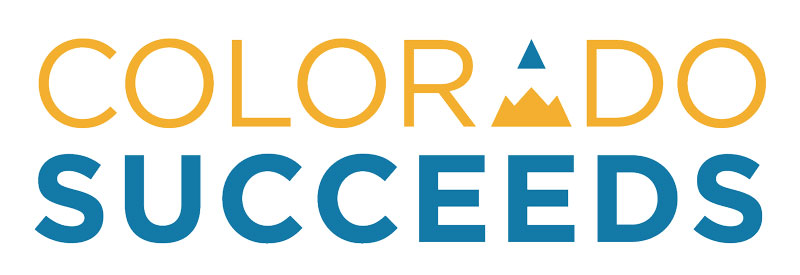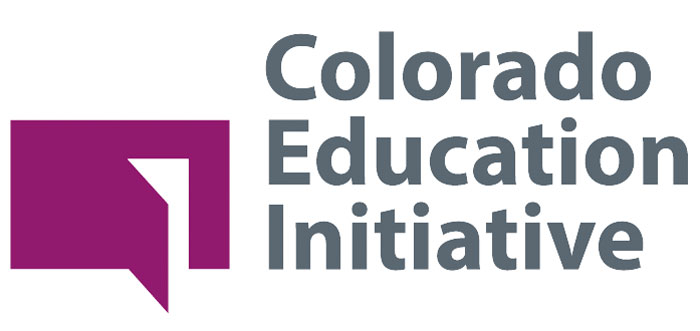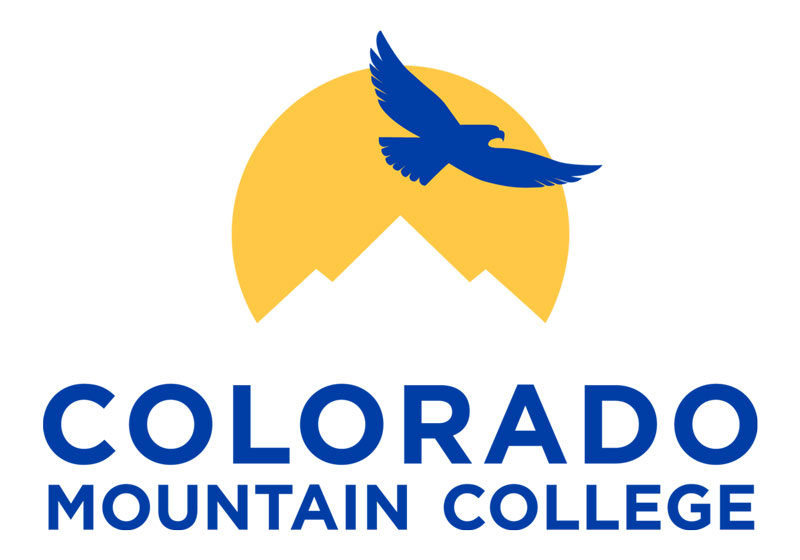INNOVATION
Colorado State Profile
Colorado Succeeds
Littleton, CO
Colorado Commission on Higher Education
Denver, CO
Colorado Education Initiative (CEI)
Denver, CO
Colorado Mountain College
Glenwood Springs, CO
Reach University
Summit School District
Frisco, CO
Educational and Workforce Landscape
Secondary K–12
Governed by:
Colorado Department of Education (CDE)
Public school enrollment K–12:
886,517 (2021–22)
School Districts: 178
Public school enrollment 9–12:
280,613 (2021–22)
Graduation rate: 82.3% (2021–22)
CTE Participation rate:
38% of all students (2021–22)
CTE graduation rate: 98%
Postsecondary
Governed by:
- CO Commission on Higher Ed
- CO Dept of Higher Education
- CO Community College System
Enrollment/Completion Data:
- 251,022 Students Enrolled
(83.2% are in-state)
https://spl.cde.state.co.us/artemis/
hedserials/hed11internet/
hed112022internet.pdf - 49.9% of 2021 high school graduates enrolled in postsecondary education
- 38.8% Complete a degree or certificate in 4 years and 60.7% complete within 6 years
- https://cdhe.colorado.gov/data-and-research/tools/data-tools/pathways-to-prosperity-postsecondary-access-and-success-
Number by Type of Schools
- 2-year Public Community College: 15
- Dual Mission Public Institution: 1
- 4-year Public University: 12
- 4-year Private University: 26
- Area Technical Colleges: 3
Public College Source: https://spl.cde.state.co.us/artemis/
hedserials/hed11internet/
hed112022internet.pdf
Workforce
Workforce Agency:
- Workforce Development Council
- Office of the Future of Work
Top Industries/Jobs:
In 2022
- Computer
- Engineering
- Education
- Healthcare
- Bio Techs
- Environmental Scientists
- Clinical Counselors
Job Openings to Worker Ratio
Colorado has more than two job openings for every unemployed worker
Points of Interest
Recently, Colorado made its Accelerating Students through Concurrent Enrollment (ASCENT) program available to all students. This means all Colorado students who meet eligibility requirements have the option to stay enrolled for a fifth year and earn college credit at no tuition cost to them or their families. Additionally, the state just reauthorized the Career Development Success Program for 10 years. This program provides $10 Million in incentive funding each year to districts when students graduate with a career-connected learning experience or industry-recognized credential.
In 2022, Colorado invested $26 million in Care Forward which allows students to access zero-cost short term healthcare credentials that the state needs. In 2023, the state built on this program investing more than $38 million to support zero-cost short-term credentials in other high-demand areas, including Construction trades (including apprenticeships), education, fire, forestry, law enforcement, and nursing.
https://cccs.edu/new-students/explore-programs/zero-cost-training-programs/career-advance-colorado/
In 2022 Colorado invested $90 million to support the Opportunity Now grant program designed to transform Colorado’s workforce through regional grants that illustrate partnership across employers and education providers and help match Coloradans with in-demand jobs that pay a living wage. The program is opening its second round and is suspected to seed education innovation across the state.
https://opportunitynow.co/
College & Career Pathways Successes
Shared Goals
The Secondary, Postsecondary and Work-based Learning Integration Task Force was created during the 2022 legislative session to develop and recommend policies, laws and rules to support the equitable and sustainable expansion and alignment of programs that integrate secondary, postsecondary and work-based learning opportunities in every region of the state. Fundamental to this taskforce is the goal that all Colorado Students graduate with a head-start via a career-connected learning experience, industry credential or meaningful progress to a postsecondary credential.
The state currently has around nine different programs where learners can earn college credits and quality credentials in high school and a key goal of the taskforce is streamlining these programs while also ensuring that the state has the infrastructure to measure outcomes, recognize credit and make it easy for students to navigate career-connected pathways.
Recent Legislative Wins
- HB22-1215 created The Secondary, Postsecondary and Work-based Learning Integration Task Force was created to help transform the pathways experience for students in Colorado and “Blur” the lines from K12 into the workforce.
- SB23-065 expanded the Career Development Incentive Program (CDIP).
- HB23-1212 created a navigator program to promote apprenticeships to high school programs, and provided funding to update the Individual Career and Academic Plan (ICAP) rules.
- SB22-192 invested $1 million in helping the state create postsecondary pathways in high-demand, high-wage fields.
- HB22-1350 invested $90 million in regional grants that will bring industry and higher education together to meet workforce needs.
- SB22-140 invested $3 million for employer incentives to initiate and scale high-quality work-based learning opportunities for adults and youth.
- HB22-1349 invested $3 million for the creation of a postsecondary student success data system, including workforce success measures, like employment outcomes and earnings.
- SB23-094 created a new school transportation task force will study a major barrier to students accessing high-quality education options, including career-connected learning in high school.
- SB21-106 created Path4ward, a pilot program that gives high schoolers the flexibility and resources to personalize their fourth year to achieve their postsecondary goals.
- SB21-216 created the Innovative Learning Pilot to offer their 9th through 12th grade high school students a variety of learning experiences that usually occur outside of the classroom without impacting a students full-time status as a student.
Other Key Programs
- The Career Development Incentive Program, passed as a pilot in 2016, provides incentives for school districts to help students graduate with industry-recognized credentials. The 2023 expansion offers 9.5 Million for 20-years.
- The Concurrent Enrollment Act, originally created in 2009, provides 9th-12th grade high school learners to enroll in postsecondary academic or CTE courses and earn high school and college credit at no tuition cost. Thanks to 2022 legislation, any student accumulating enough credits can qualify for a fifth year to enroll in free postsecondary coursework under the ASCENT program.
- Teacher Recruitment Education and Preparation (TREP) allows qualified learners to concurrently enroll in courses in a teaching career pathway for the 5th and 6th years of high school.
- Colorado law supports Early Colleges, which require learners to enroll in and complete secondary and postsecondary courses while enrolled in high school, allowing students to graduate with at least 60 credits toward their postsecondary education and/or an associate’s degree.
- Colorado law supports P-TECH programs, which require partnerships with industry and include up to 6 years of high school and are designed to prepare learners for high-demand careers in industry by enabling them to graduate with a high school diploma and an industry-recognized associate degree.
Pathway Successes
Homegrown Talent Initiative & Rural Coaction:
Since 2019, Colorado Succeeds, the Colorado Education Initiative, Empower Schools, and Lyra Colorado, have worked with more than 60 districts, helping transform education and local economies in rural Colorado. Individually, school districts convene educators, business leaders, students, and community members to make this work a reality. This work started through private funding serving eight districts as part of the Homegrown Talent Initiative, and has created regional networks to continue to support this work through state funding, Coaction grants through the Colorado Department of Education. These COVID relief funds focused on creating sustainable infrastructure by redefining student experiences and making career-connected learning an integral part of high school education.
RISE Grants:
In 2021, Colorado invested more than $40 million in RISE funds to support high-needs school districts, charter schools, and public institutions of higher education to address the learning challenges related to the economic, social, and health impacts of COVID-19 in a manner that creates sustainable innovations that improve student learning, close equity gaps, and enhance operational efficiency for pre-K-12 through higher education. These grants seeded a Collaborative in southwest Colorado that allowed districts to pool resources for strong postsecondary pathways, connected classrooms across districts served by the 13 Colorado Mountain College branches to dramatically increase concurrent enrollment and many other projects that will help more Colorado students have access to career-connected learning opportunities before completing high school, as well as have access to strong pathways to postsecondary opportunities.
Year Two Site Profile

Meet the Site Partners
Lead Organization:
Colorado Succeeds

Colorado Succeeds is a nonprofit, nonpartisan coalition of business leaders invested in improving schools, changing educational outcomes for all students, and shaping the future of Colorado’s workforce. Together, we support the educators who are innovating in the classroom and the policymakers who are changing the system. We believe great schools are good business. We know when Colorado schools improve, everybody wins.
At Colorado Succeeds, we have come to believe that passing policy is not the finish line but the starting point. That’s why we engage in a continuous policy-practice feedback loop, through which we invest in implementation and monitor outcomes to ensure policies remain relevant and impactful in practice. The LAUNCH program allows us to work with national partners and state and local leaders; learn what’s working in other states, what challenges people are facing, and we share best practices that can real impacts in Colorado.
Scott Laband,
President Colorado Succeeds
Colorado Education Initiative

Systems change requires both a shift in practice and in mindsets. CEI helps teachers, school leaders, and district stakeholders to catalyze bold, comprehensive change in public education in Colorado. We share cutting-edge ideas in education, highlighting the work of educators who are leading the way, and engage in conversations in person and virtually that encourage debate and advance emerging topics in the education ecosystem.
I am a retired small-town superintendent of schools with 25 years of experience and have the pleasure of working daily with rural superintendents, empowering them to transform communities through workplace opportunities for students. The LAUNCH initiative connects K12 and postsecondary leaders to find solutions for their students. We always talk about the support students need to succeed, but LAUNCH helps district and higher education leaders to be genuinely innovative in meeting those needs.
George Welsh Senior Partner,
Colorado Education Initiative
Colorado Mountain College

Colorado’s first dual mission institution, Colorado Mountain College (CMC) is a public education institution known for its stunning locations and its unique blend of academic and outdoor experiences. In partnership with local industries, CMC offers career-oriented programs that serve both traditional and non-traditional students, making higher education attainable for many in the region. Their 13 campuses partner with school districts throughout the rural mountain region to be one of the state’s largest providers of Concurrent Enrollment
As a dedicated Hispanic serving institution with a dual mission, situated in the heart of rural mountain regions, Colorado Mountain College recognizes the significance of forging strong connections and collaborations with local school districts. Our commitment to being a major, and often sole, educational resource in these rural communities compels us to create meaningful partnerships. Through LAUNCH, we are empowered to actively engage with educational leaders and state officials to co-create and implement innovative solutions. These solutions are strategically designed to address disparities in equity and access, thereby unlocking pathways to economic mobility for a more diverse range of students throughout Colorado. By nurturing these collaborations, we not only uplift individual learners but also contribute to the holistic growth and prosperity of our rural communities.
Yesenia Silva Estrada,
Executive Director of Strategic Initiatives Colorado Mountain College
Reach University

Summit School District

Summit School District provides excellence in public education to families in the diverse resort mountain communities of Breckenridge, Dillon, Frisco, and Silverthorne. Our vision for the more than 3,450 students we serve is to prepare caring, courageous, community-minded people who create a better world.
For a district with our location and diverse population, it’s important to ensure all of our students feel welcome, supported, and prepared for success in a rapidly changing world with a well-rounded education. A major part of a well-rounded education is giving students the opportunity to explore different career pathways and earn industry credentials while they are with us. We also need to remove barriers to implementation. LAUNCH is giving us an opportunity to work with our closest postsecondary partner to find the thing that will have the most impact for our students with the support of state and national leaders and partners.
Tony Byrd,
Superintendent of Summit County Public Schools
Reference Links and More Information
Learn more about:
- Colorado Office of Postsecondary and Workforce Readiness
- Colorado Talent Pipeline Report
- Colorado’s Higher Education System
- What happens to High School Graduates in Colorado
- Colorado’s Zero Cost Training Programs
- Opportunity Now
- Colorado’s “Big Blur” Taskforce
- Colorado’s Career Development Incentive program and student credentialing in high-school
- Colorado’s rural collaboration
- The Homegrown Talent Initiative
- The correlation between seat-time and experiential learning

 Impact Site
Impact Site Innovation Site
Innovation Site